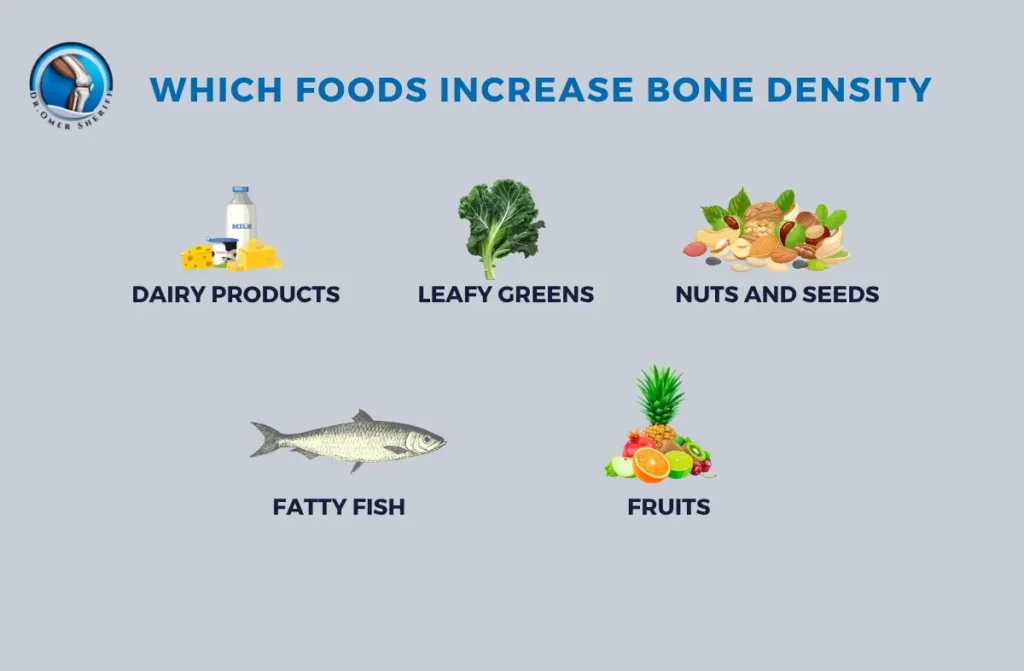How to improve bone health is a question that everyone, regardless of age, should think about. Your bones are the foundation of your body, supporting movement, protecting organs, and storing essential minerals. Unfortunately, many of us don’t focus on bone health until it’s too late. In this article, Dr. Omer Sheriff, will guide you on how to improve bone and joint health, how to improve bone health in women and men, and why bone health is important for everyone.
Why is Bone Health Important?
Our bones are much more than structural supports they’re living tissues that constantly change and adapt to our body’s needs. Understanding why bone health is important can help you take steps to maintain strong bones throughout life.
- Bones protect vital organs like the brain, heart, and lungs.
- They serve as the body’s mineral bank, storing calcium and phosphorus.
- Weak bones can lead to fractures, limited mobility, and serious conditions like osteoporosis.
How to improve your bone health? Proper nutrition, regular exercise, and healthy lifestyle choices are crucial. For women, knowing how to improve bone marrow health is especially critical, as hormonal changes during menopause can accelerate bone loss. Taking early action ensures your bones stay strong and resilient for years to come.
What Are the Symptoms of Poor Bone Health?
- Frequent Bone Pain and Tenderness: Persistent pain in the back, hips, or legs often signals weak bones. This discomfort can result from reduced bone density or early signs of conditions like osteoporosis, making everyday movements increasingly difficult.
- Fractures from Minor Falls: Fragile bones can break easily, even with minimal trauma such as bumping into furniture or slipping slightly. Such fractures are warning signs of deteriorating bone strength.
- Loss of Height or Stooped Posture: Gradual height reduction or a bent spine can occur due to vertebral compression fractures, common in individuals with poor bone health.
- Weak Grip Strength and Brittle Nails: A decline in grip strength and easily breakable nails often indicates low calcium or collagen levels in the body, affecting both bones and connective tissues.
- Slower Healing of Injuries: When bones take longer to heal after fractures or sprains, it reflects inadequate bone regeneration and mineralization, highlighting poor skeletal health.

What Factors Put Bone Health at Risk?
- Nutritional Deficiencies: Inadequate intake of calcium, vitamin D, and protein weakens bone density. Understanding how to improve calcium in our body through dairy, leafy greens, and fortified foods is essential for maintaining strength.
- Sedentary Lifestyle: Lack of weight-bearing activities like walking, jogging, or strength training decreases bone mass. Regular physical activity supports how to make muscles and bones strong by stimulating bone formation.
- Hormonal Imbalances: Low estrogen in women or testosterone in men can accelerate bone loss, especially after middle age.
- Smoking and Excessive Alcohol Use: Both habits interfere with calcium absorption and collagen production, leading to weaker bones over time.
- Certain Medications and Diseases: Long-term steroid use, thyroid disorders, or autoimmune diseases can reduce bone mineral density and increase fracture risks.
What Happens to My Bones as I Get Older?
- Decreased Bone Density: With aging, the body’s ability to regenerate bone tissue slows, resulting in gradual mineral loss. This reduction affects how to increase bone strength naturally and makes bones more brittle.
- Reduced Calcium Absorption: As digestive efficiency decreases, so does calcium absorption. Learning how to improve calcium in our body through diet and supplements becomes crucial after the age of 40.
- Hormonal Changes: Post-menopausal women experience a sharp drop in estrogen, which protects bone mass. Similarly, men see a gradual testosterone reduction affecting bone metabolism.
- Muscle Weakness: Age-related sarcopenia (muscle loss) puts extra strain on bones and joints, impacting how to strengthen bones and joints naturally for daily stability.
- Postural Decline: Bones in the spine compress, causing curvature or height loss, affecting mobility and balance in later years.
What Can I Do to Improve My Bone Health?
- Eat a Balanced, Calcium-Rich Diet: Include milk, yogurt, cheese, tofu, and leafy greens. These foods contribute to how to make muscles and bones strong and ensure continuous calcium replenishment.
- Increase Vitamin D Intake: Sun exposure and vitamin D-rich foods enhance calcium absorption and support how to increase bone strength naturally through better mineral balance.
- Engage in Weight-Bearing Exercises: Activities such as brisk walking, squats, and resistance training improve how to make bones and joints strong and stimulate bone remodeling.
- Limit Smoking and Alcohol: Reducing these habits improves bone mineralization and joint flexibility, aiding how to strengthen bones and joints naturally.
- Maintain a Healthy Weight: Excess weight strains bones, while being underweight can lead to bone loss. Aim for a balanced BMI to keep skeletal structures healthy.
When Should I See My Doctor?
- Frequent Fractures or Bone Pain: If you experience repeated fractures, persistent back pain, or changes in posture, medical evaluation is necessary to rule out osteoporosis or vitamin D deficiency.
- Unexplained Height Loss: Losing more than an inch in height may indicate vertebral compression fractures, signaling weak bones.
- Family History of Bone Disorders: Those with genetic predisposition should undergo early bone density testing and follow preventive measures on how to make muscles and bones strong.
- Long-Term Medication Use: If you’re on steroids, thyroid medication, or have autoimmune disorders, consult your doctor for monitoring and how to increase bone strength naturally through lifestyle adjustments.
- Post-Menopausal Women and Older Adults: Regular screening helps assess bone density and guides interventions on how to make bones and joints strong effectively.
What Affects Bone Health?
Several factors influence bone health, many of which are within your control. Let’s explore these factors to understand how to improve bone health effectively.
- Age: As we age, our bones naturally lose density. This process starts in our 30s and accelerates in older age, making bones more susceptible to fractures.
- Hormonal Changes: Hormones like estrogen in women and testosterone in men play a key role in maintaining bone density. Hormonal imbalances or menopause can weaken bones significantly.
- Dietary Deficiencies: A lack of calcium, vitamin D, or other essential nutrients deprives your bones of the building blocks they need to stay strong.
- Lifestyle Choices: Smoking, excessive alcohol consumption, and a sedentary lifestyle are detrimental to bone health.
Dr. Omer Sheriff emphasizes that understanding these factors can help you make informed choices about how to improve bone health and maintain a high quality of life.
What Supports Bone Health?
Supporting your bone health involves making daily choices that strengthen and nourish your bones. Here are some practical tips:
- Calcium-Rich Diet: Calcium is the cornerstone of bone health. Foods like milk, cheese, yogurt, and fortified plant-based alternatives are excellent sources.
- Vitamin D: Without vitamin D, your body cannot absorb calcium effectively. Spend 15–30 minutes in sunlight daily or consume foods like fatty fish and fortified cereals.
- Regular Exercise: Physical activity, especially weight-bearing and resistance exercises, stimulates bone formation. Walking, jogging, or lifting weights are excellent ways to boost bone health.
- Avoid Bone-Damaging Habits: Smoking and excessive alcohol consumption can weaken bones over time. Limiting these habits is essential to protecting your skeletal system.
By following these steps, you’ll understand not just what supports bone health but also how to improve bone health in practical, sustainable ways.
How Does Exercise Improve Bone Health?
Just like muscles, bones get stronger the more you use them. When you do weight-bearing or resistance exercises, your bones respond by building more density and strength. Here are a few bone-friendly exercises:
- Walking or light jogging: Easy on the joints but effective for bone strength.
- Dancing or aerobics: Fun ways to build endurance and balance.
- Resistance training: Lifting light weights or using resistance bands can help build muscle and protect joints.
Exercise also improves posture, coordination, and balance, all of which are important in preventing falls and injuries. Plus, it boosts bone marrow health by promoting circulation and the production of healthy blood cells.
Food for Healthy Bones
Your kitchen plays an important role in your bone care routine. Eating a balanced diet full of nutrients is a natural and delicious way to improve your bone health. Focus on foods rich in:
- Calcium: Milk, cheese, yogurt, tofu, almonds, and leafy greens like spinach and kale.
- Vitamin D: Egg yolks, fortified cereals, and safe exposure to sunlight.
- Magnesium & Zinc: Found in whole grains, seeds, avocados, and legumes.
- Protein: Vital for muscle and bone repair—found in beans, fish, chicken, and lentils.
A colorful, nutrient-dense plate supports bone and joint health and fuels your body’s repair systems from within.
What Can I Do to Keep My Bones Healthy?
When it comes to how to improve your bone health, consistency is key. Here are some small yet powerful actions you can start today:
- Ensure adequate calcium and vitamin D: These nutrients are essential for bone strength. Vitamin D helps your body absorb calcium, which is the main building block of bones.
- Quit smoking: Smoking can interfere with the body’s ability to absorb calcium and slows bone healing.
- Limit alcohol: Heavy alcohol use is linked to weaker bones and a higher risk of fractures.
- Stay physically active: Movement encourages bones to rebuild and stay strong.
By focusing on how to improve bone and joint health daily, you reduce your risk of fractures and discomfort as you age.
Bone Health in Women
Bone health in women is essential for maintaining strength, mobility, and overall quality of life. Women, in particular, are more prone to bone-related issues like osteoporosis and fractures due to hormonal changes, especially after menopause. By taking proactive steps, you can significantly improve bone strength and health. Dr. Omer Sheriff shares tips and advice on maintaining optimal bone health in women.
11 Ways to Increase Bone Density Naturally
If you’re wondering how to improve bone marrow health without medications, here are 11 natural and effective strategies:
- Get regular sunlight: Helps your body produce vitamin D.
- Incorporate strength training: Builds both muscle and bone.
- Eat more calcium-rich foods: Keeps bones dense and strong.
- Cut down on processed foods: These can cause inflammation and leach minerals from the bones.
- Avoid smoking: It accelerates bone loss.
- Limit caffeine and alcohol: Both can interfere with calcium absorption.
- Practice balance exercises: Such as yoga or tai chi to prevent falls.
- Stay active during the day: Avoid sitting for long hours.
- Get regular bone density tests: Especially if you have risk factors.
- Manage stress: High stress levels can affect hormones related to bone health.
- Consult an orthopedic specialist: Personalized advice can go a long way in protecting bone marrow health and overall joint wellness.
Why Bone Health is Important for Women
Women are more likely to suffer from osteoporosis due to hormonal changes during menopause. Knowing how to improve bone health in women is crucial for reducing these risks. Dr. Omer Sheriff suggests that women:
- Focus on calcium and vitamin D intake from an early age.
- Engage in strength training to build bone density before menopause.
- Regularly check bone health with scans to catch any issues early.
These steps are essential for women who want to maintain strong bones and live an active, pain-free life.
Conclusion
How to improve bone health is not just a medical question it’s a lifestyle choice. By taking small but consistent steps like eating nutrient-rich foods, staying active, and avoiding harmful habits, you can protect your bones and ensure they remain strong for years to come. By understanding how to improve bone health, you’re not just protecting your skeleton you’re investing in your freedom to move, play, walk, and live fully. From nutrition to movement, and from rest to routine care, everything you do matters.





